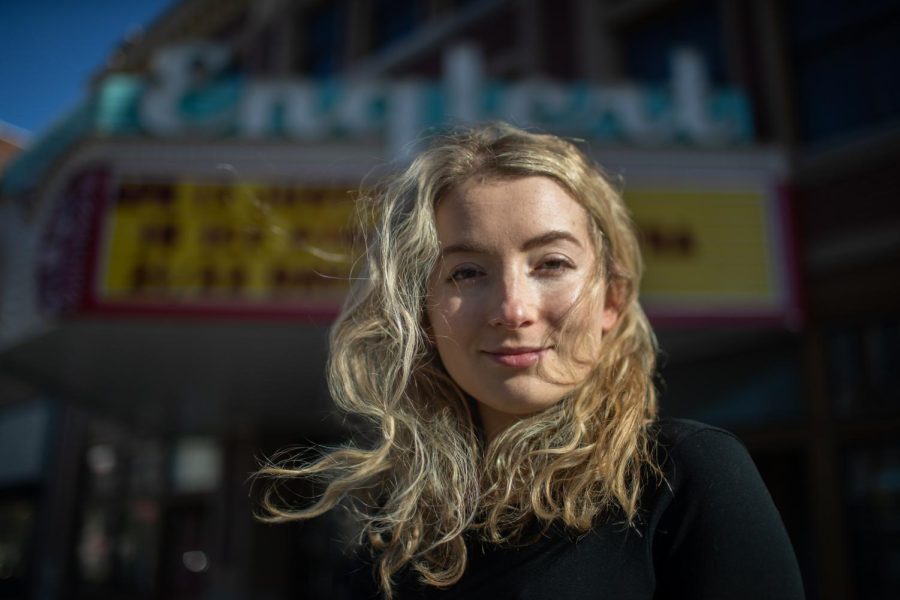Ask the Author | Jenny Singer
MFA student and nonfiction writer Jenny Singer was selected as The Englert Theatre’s fifth annual nonfiction writing fellow. Singer is originally from Seattle, and often focuses on writing essays and performing arts criticism.
Jenny Singer, a recipient of the Englert Theatre fifth annual Nonfiction Writing Fellowship and first-year MFA candidate in the University of Iowa’s Nonfiction Writing Program, poses for a portrait outside of the Englert Theatre in Iowa City on Monday, April 17, 2023.
April 18, 2023
Jenny Singer is a first-year MFA student in the University of Iowa’s Nonfiction Writing Program. Originally from Seattle, Washington, she has written for publications like *Glamour Magazine, The Forward, Time Out New York, and San Francisco Weekly, among others. Singer was chosen as The Englert Theatre’s fifth annual recipient of their Nonfiction Fellowship in December 2022.
The Daily Iowan: How did you get your start in writing, and how did that lead to where you are now?
Jenny Singer: I was not someone who particularly loved writing as a child. I hear from a lot of writers that they were always trying to like write a book when they were five years old, or that they journaled every day of their lives. And I want to add to that narrative the data point of someone who wasn’t a particularly big writer. As a child, I loved theater, and I think I found that I could get tickets, free tickets to see theater if I reviewed the theater for like a really cool government-funded teen arts criticism organization in Seattle where I grew up. And I think I was just really opinionated and fond of my own voice in a way that is common in the Venn diagram between writers and performers. So, writing theater criticism was a really exciting opportunity for me to write down 600 to 1000 words of my own opinions on a topic I really cared about. And then after, and in college, I did a couple of internships at newspapers. I interned for the *San Francisco Weekly,* which is an independent weekly newspaper, and I interned for *Time Out New York.* I was studying at a college in New York City, and I loved the opportunity to write in a breezy, funny way about entertainment, which has always been the case in print entertainment writing and lifestyle writing. And then it was really exciting to see like the online voice of pop culture and entertainment criticism develop. After, eventually in my twenties, I got an internship for a Jewish nonprofit newspaper, and that turned into a full-time job. It was called *The Forward;* it’s a major Jewish nonprofit newspaper. I moved from my job there to a job at *Glamour,* which is a women’s magazine. I was at *Glamour* for two years, and then I applied to this MFA.
DI: What are some of your current projects?
Singer: I’m working on a lot of things. I love writing essays, and I love that the non-fiction program in Iowa is a very essay-based program. I love that an essay is such a portable, and I think, such a welcoming genre. You do not have to make a major time commitment to a text or to a writer, which I think is really nice with the attention spans we’ve developed in the digital age. So, I am really working on taking any topic in the world I think is interesting and saying, “I’ll just write an essay about it” because it’s just an essay, you know, how long could it take? I feel like I’m the Lucille Bluth “How much does a banana cost?” meme, if you’re familiar, but I think in part because I’m doing a little fellowship at the Englert and in part because of my interest in arts criticism, I’m doing a little bit of writing about performance and spectral performance. I just wrote an essay about the musical “Annie” as both an American cultural artifact and as something that I performed in as a very attention-seeking child. And I recently wrote about this in sort of a similar vein, the impact, of the sometimes toxic relationship between people who teach theater and acting on every level, like on the level of little children and high school and adult performers. So, I think right now I’m definitely interested in questions of performance and how the desire for attention manifests anywhere from somewhere like TikTok to somewhere like a stage.
DI: What was your reaction when you were selected for the Englert fellowship?
Singer: Oh my gosh. I was really honored because the Englert is such a pillar of the arts culture and community in Iowa City. I was extremely honored. Also because I’ve worked for nonprofits before and I know that when nonprofits allocate their resources, that those are scarce resources, and that you want to use them really carefully because so much work has gone into raising money for a nonprofit, so I wanted to make the most of it. I mean it’s funny because part of the fellowship is getting free tickets to any show at the Englert at any time, which is such an absurd privilege and it’s not like we’re hard up for cultural events in Iowa City. There’s so much access and so much, such great abundance of cultural events. So, it’s been amazing to just like immerse in such a variety of performances and in things that I wouldn’t have gravitated to, that I wouldn’t have spent money on because of my own narrow-mindedness or my own personal preferences. And because of this, I’ve been able to see a much wider range of performers than I would’ve otherwise. The team there has just been extremely lovely, and it’s been exciting to see what kind of work goes into running a major arts organization in a town like this.
DI: Is there anything else you want to mention?
Singer: I guess one thing I would want to mention is that I know if you’re an undergrad, you are just bombarded with cultural opportunities and claims on your time. And one pitch I would give for the Englert is that the beautiful and like sparkly, brightly lit facade makes it look like it would be somewhere that you could only enter if you’d purchased a very expensive ticket. But there are actually free events there all the time, and really affordable events there all the time. Make sure you don’t graduate without a couple of trips to the Englert. There are absolutely lots of great free things there.















